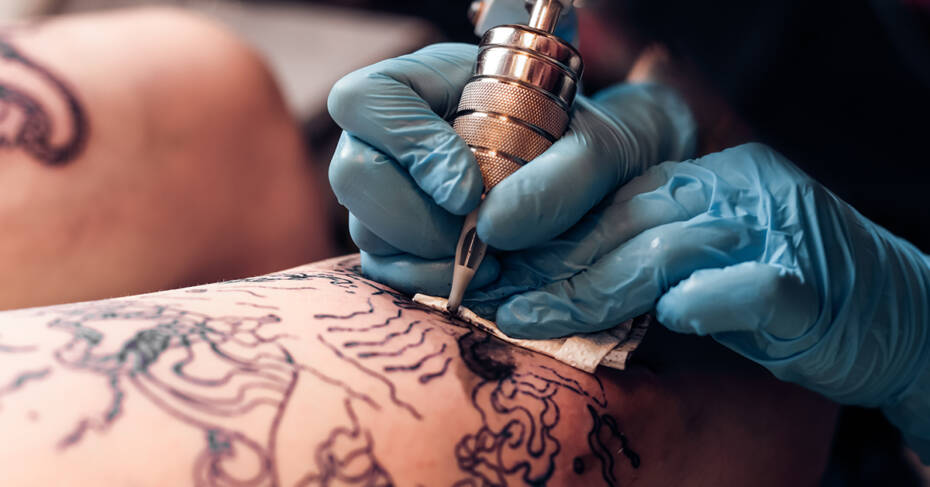Tattoo artists are so lucky that they get to say they love their job, as not many people can. Being a tattoo artist comes with a lot of perks. We get to earn a great living while making art every day. We get to meet new people, work all over the world, and change people’s lives.
Each person’s journey to becoming a tattoo artist is different as there is no set degree or course you take to become a tattoo artist.
There are 3 main ways that people become tattoo artists: self-taught artists, people who have completed “tattoo school”, and the traditional tattoo apprenticeship method. This article will cover how to become a tattoo artist using the traditional tattoo apprenticeship method: the most respected way to get into the tattoo industry.
We will also take a look at what you should include in your portfolio, what an apprenticeship will entail, and what tattooing is like as a junior and senior tattoo artist. We will also reflect on how you can go from being a tattoo artist to being a shop owner, and the steps you can take to be a respected artist in the tattoo community.
- A tattoo apprenticeship is the best way to become a tattoo artist: most tattoo schools are a waste of money and cannot teach you everything you need to know in a short amount of time.
- It may take a few years of trying before you find the right apprenticeship.
- The most impressive thing you can have in your portfolio is traditional watercolor and spit shading paintings. This shows you understand the basics of tattooing.
- Get tattooed in a studio a few times before asking them for an apprenticeship.
1. Reality Check: Becoming a Tattoo Artist is Difficult
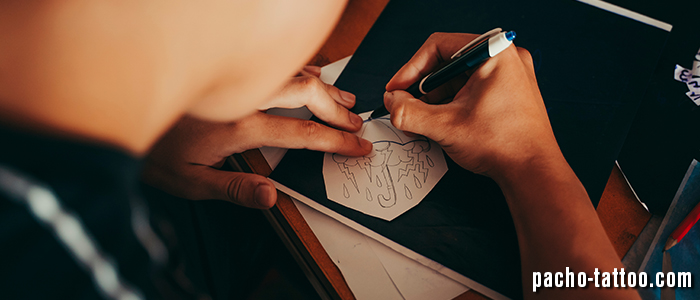

The path to becoming a tattoo artist is long, stressful, and complicated. The first step is to think about whether or not this is the career you truly want. While being a tattoo artist comes with a lot of perks, it is also a lot of hard work.
Before you even start tattooing, you will need to take an (usually) unpaid apprenticeship with long hours and a very strict boss. You will miss birthdays and public holidays, work late into the night, and have to work weekends. You will also need to take into consideration that some members of your family or friends might not agree with your chosen career and that you will work extremely hard for very little in the beginning.
Some artists have even lost friends because of the long hours worked you need to work when you first start tattooing. Most studios don’t offer retirement options, health insurance, or even do your tax for you.
There are also dry periods during the year where you may not earn a lot of money as tattooing is a luxury service. This is the reality of tattooing and may be why a lot of people fail during the early days of their apprenticeships.
It doesn’t sound too good, does it?
2. What to Include in Your Portfolio and Approaching Tattoo Studios
Before you even think about contacting a tattoo studio for an apprenticeship, you need to make sure that you have a strong and diverse portfolio. Your portfolio should consist of a lot of good-quality drawings and paintings, either digital, physical, or (even better) both. Make sure that your physical portfolio is well-presented and organized. We recommend an A4 black art file and good quality paper. A physical portfolio presents a lot stronger than an online portfolio and shows that you have gone the extra mile to prepare for your interview.
Display only your BEST drawings – we don’t want to see half-finished or weak drawings. You can focus on a specific style, but always make sure that your fundamentals are on-point: strong line work, an understanding of color combinations, and smooth shading are important. We are always more impressed when we see some American Traditional watercolor and spit shading paintings as this shows a respect for tattoo history, and American Traditional designs will always show the fundamentals that we look for in tattooing. Even if you want to be a realism tattoo artist, having strong line work is important as you will start out with small tattoos, such as script and small symbols, and these need good quality line work.
You should include drawings that show that you understand form and flow. You can do so by creating designs to fit a specific body part. We recommend tracing the outline of bodies and blowing them up to fit the page. You can then design on top of the outline to show an understanding of form. We recommend making sure that each artwork is on its own page. We do not want to see a bunch of cut out old drawings stuck together to create your portfolio. Take the time to research trends and draw modern designs in two or three different styles. If you are still unsure of what to include in your portfolio, you can approach studios and ask for advice – We often advise aspiring tattoo artists on how to improve their portfolios.
The next step is the scary part: approaching a tattoo studio. You can either approach a studio that is advertising an apprenticeship, or you can build a relationship with a reputable shop and ask them, or you can get a job in the studio as the receptionist first and you may be offered a spot. Regardless of how you go about getting your apprenticeship, it is a good idea to get tattooed in the studio a few times beforehand. That way you get to know their vibe and see if it is a space you want to work in.
You can also pop in for a visit now and then, bring the artists some donuts, and ask for drawing advice. It might take a few tries before they say yes to you – we know someone who asked a studio 6 times before they said yes! After all, a lot of blood, sweat, and tears go into teaching someone how to tattoo and as an artist you don’t want to waste your time trying to teach someone who does not truly want to learn.
You will leave a better impression if you pop into the studio with your portfolio and ask to speak to an artist when they have a gap. 3pm is a good time as this is when the studio is quieter. Artists are quite busy and may not even respond to a text or email about an apprenticeship. If the studio you approach isn’t ready for an apprentice, don’t be defeated. Keep drawing and improving your skills and try again in a few months. Once you have finally gotten your apprenticeship, the hard work begins.
3. Tattoo Apprenticeship: What it Entails
Once you have gotten your apprenticeship, the artist will explain what your apprenticeship timeline will look like and what your daily duties are. Our timeline is as follows:
Month 1-3:
- Cleaning the shop and bathroom thoroughly in the morning and evening. Sweep, mop, tidy, dust, and restock front and back.
- Front desk duties: quoting clients, answering the phone, social media management, taking bookings and payments, answering emails, and ordering stock.
- Run errands for the artists and the shop.
- Drawing critiques and prompts weekly.
- Take BBP course.
Month 3-6:
- All of the above.
- Set-ups and breakdowns for all artists throughout the day.
- Stencils and some basic design work for artists.
- Manage personal tattoo Instagram account and post drawings daily.
Month 6-9:
- All of the above.
- Start tattooing on fruit and fake skin.
- First few tattoos on yourself.
Month 9-12:
- All of the above.
- Apprenticeship tattoos: for free or set-up cost. You can only tattoo friends and family for the first week, and then this is opened this to the public.
- Critique after every tattoo, and the designs start to be more detailed the more you tattoo.
After 12 months, you can graduate as a junior tattoo artist. Each tattoo studio is different – some studios have very short apprenticeships of 3 – 6 months, and some say that you need to apprentice for at least 2 years before you even pick up a tattoo machine. This will depend on the type of mentor and apprenticeship. Personally, we think that it is better to have a longer apprenticeship as your fundamentals will be stronger when you start tattooing and you will be a better artist.
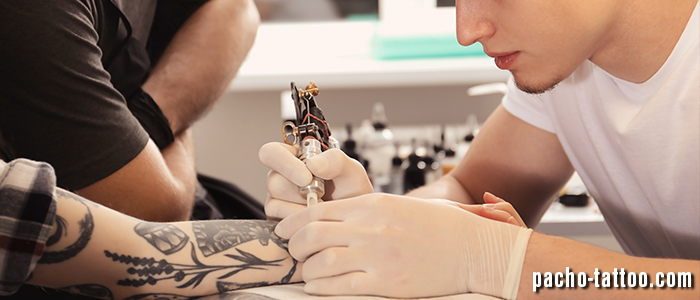

Your duties may also be a bit different depending on your mentor and the studio rules, but the basics will be the same: you will clean, you will learn how to avoid cross-contamination and how to sterilize properly, you will do some design work and stenciling, and you will need to learn how to manage clients. Be prepared for some harsh critiques, staying after hours if an artist is working late, and running errands. You will also spend hours watching the other artists tattoo, as this is when you learn the most. We recommend keeping a notebook and asking a lot of questions while watching your mentor work.
You will need to invest in your craft by buying art supplies, your first tattoo machine, and an iPad and Apple Pencil. It may be necessary to have a side hustle while you do your apprenticeship – You can bar tend, sell merch, and work online while you do your apprenticeship. You can also ask your mentor if there are things you can do around the shop for extra money, like running the social media or being the receptionist on weekends. After a lot of hard work, you will graduate to a junior tattoo artist, and this is where the fun begins.
4. Tattooing as a Junior Tattoo Artist
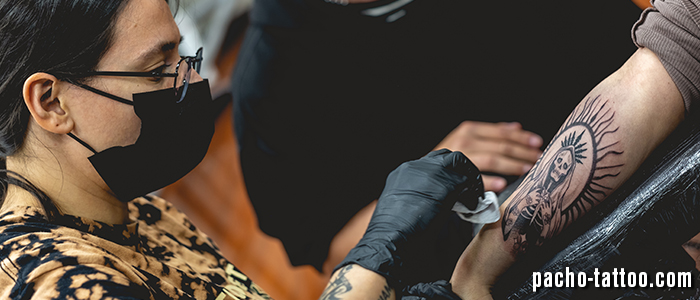

When you have graduated from your apprenticeship, you will become what is known as a junior tattoo artist. Junior artists generally do smaller tattoos than senior artists and their hourly rate is lower. This is because they have less experience and are still learning, so there is a small risk when getting tattooed by a junior artist. Junior artists usually get given walk-in tattoos, smaller tattoos that people want to get on a budget, and they still get critique after most of their tattoos are done.
This is a great time to tattoo as much as possible, take on exciting new projects, and learn as much as possible. You will start to establish yourself as an artist and other artists will start interacting with you online. You will still be finding your feet and experimenting with different styles and techniques, but your mentor may limit the size of the tattoos you are allowed to do for now.
Stay humble during this time and celebrate your wins and learn from your losses. This is a good time to connect with other studios, attend tattoo conventions, and take advantage of your lower rate as people may be more open to you changing up designs and letting you do portfolio work.
5. Tattooing as a Senior Tattoo Artist
There comes a point in your career when you become known as a senior tattoo artist. There is no set time frame for this, but rather a level of respect that gets earned. For some artists it could be 5 years after their apprenticeship, for some it’s 20 years, and for some this never comes. When you are a senior tattoo artist, you can pick and choose what you want to tattoo.
You can set your rate which is usually higher than most others in the shop, and you may only want to take on large projects with people that you get along with. This is when tattooing becomes extremely enjoyable and it is well-earned. You may decide to take on an apprentice at this point in your career, or you may decide to open a shop. Whatever you choose, a lot of love, time, and dedication needs to go into it.
6. Being a Tattoo Shop Owner
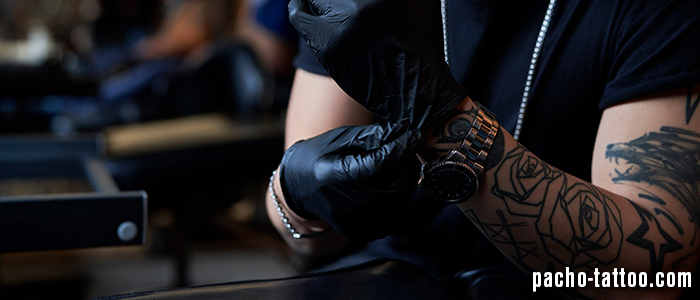

Becoming a tattoo shop owner is a big decision to make and is usually done when you have been tattooing for several years. It takes a lot of patience, business knowledge, and boundaries to become a tattoo shop owner. There is a fine line between having an easy-going shop with mutual respect, and having people take advantage of you.
Working with artists will always have its ups and downs, and you may find that they are grumpy, non-cooperative, or take advantage of you. Being a shop owner also means dealing with the public daily, and making sure your artists are taken care of, and making enough money to keep the doors open.
Being a tattoo shop owner can be great- it comes with a lot of freedom. You get to take days off as you need them, travel, and tattoo when you want to but this route is not for everyone. You need a business mind to make it work as you need to come up promos, events, have merchandise and aftercare for sale in store, manage budgets and stock, and be able to handle conflict and shop drama.
It’s also a good idea to have a strong relationship with the tattoo community before opening a store. It is helpful to have support from the people around you who have been doing this for years. It is also rewarding to feel part of a community, get invited to conventions as a shop, have a space to call your own, and develop a brand with a message that you stand by. Whatever your journey entails, there is no right way to have a tattoo career but there is a right way to start it and that is with a proper apprenticeship.
What Not To Do:
Attend Tattoo Schools
Tattoo schools are a complete waste of time and money. There is no way to learn everything you need to know about tattooing in a week or two. A proper apprenticeship lasts at least one year and covers everything you need to know about tattooing. Tattoo schools are money-making schemes and are not respected in our industry.
Learn From Home
Do not buy a kit from Amazon and think you can just teach yourself at home. Tattooing is an ancient craft that deserves more respect than that. You cannot learn correct sterilization procedures, tattooing techniques, or trade secrets through YouTube videos. If you are a self-taught tattooer, chances are you won’t be able to access quality products or machines as most suppliers will not sell to you.
Apprentice at an Untrustworthy Studio
It might seem like an easy foot in the door, but apprenticing at an untrustworthy tattoo studio will do more harm than good. It is much harder to get a job in a good studio if you have a bad studio behind your name. Rather wait it out and get the right start to your career.
FAQ
Can you tattoo if you can't draw?
Technically you can tattoo if you can’t draw as tattooing is 50% technique. However, being able to draw is an extremely important part of tattooing. You will need to understand form, shape, tone, and color before picking up a tattoo machine. You also need to have a steady hand and a good eye which is taught through drawing.
What makes a good tattoo artist?
Dedication, patience, and talent are all good qualities to have as a tattoo artist. Drawing skill is a bonus, but anyone can learn how to draw with enough practice and passion. You also need tough skin as it can be a very critical industry to be in. You need to have great people skills and be confident in your ability.
Are tattoo artists happy?
Most tattoo artists that we have worked with are happy as they genuinely love their job. However, as with most artists, they can go through rough patches when facing a creative block or having made a mistake on a tattoo.
Does tattooing take skill?
Tattooing takes a lot of skill. You need to understand how the machine and needles work, how to achieve certain shades and textures, and have a keen eye for detail. Each person’s skin is different, so you need to be able to adapt and adjust to work with challenging skin.
Is tattooing a good job?
Tattooing is a good job to have as there is the potential to make a lot of money as a tattoo artist. You may have to sacrifice some time with your family and put a lot of hard work into your craft, but it is very rewarding when you become a recognized. You can travel with this line of work.
A Step-by-Step Guide on How To Become a Tattoo Artist


Tattooing is an extremely rewarding and exciting career, with a lot of room for growth and the chance to own your own business. There are a few ways to become a tattoo artist, but the most respected and best way to learn is with a tattoo apprenticeship in a reputable studio. It will be a lot of hard work in the beginning, but it is worth it. If you’re serious about becoming a tattoo artist, you will need to be fully dedicated to your apprenticeship.
